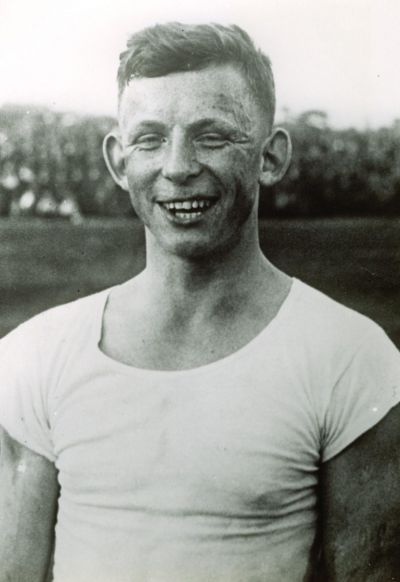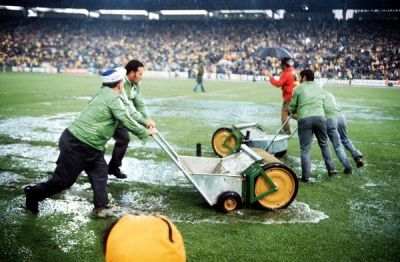Ernst Willimowski

His football career would have put all the Klos’ and Podolskis in the shade. The way he played would have made him a superstar today like Messi, Ronaldo and Lewandowski. For he was the leading goalscorer in Poland and Germany. Even more! He succeeded in doing something which no one before or after him has ever done. To play for both the Polish and German national teams - Ernst Willimowski.
Ernst Prandella (later Willimowski) was born in Katowice in Upper Silesia in 1916 at a time when Upper Silesia was both German and Polish. In the same year his father died at the front. His mother Pauline Prandella considered herself more German than Polish and so she sent him to a German school. His stepfather, Willimowski, who regarded himself as a Polish patriot, later sent him to a Polish grammar school. At the age of nine Ernst Willimowski opted to join a football team from the German minority population: 1. FC Katowice. Because he was so good he was transferred to the neighbouring club, the Polish champions, Ruch Wielkie Hajduki (formerly Bismarckhütte BC and now Ruch Chorzow).
With Ruch he was Polish champion in 1934, 1935, 1936 and 1938. In his 88 games for the Upper Silesian club he shot 112 goals, a hitherto unknown quota. His goalscoring quota for the Polish national team was equally superb and has never been equalled since: 22 goals in 21 games. His most outstanding game for Poland was in the final-16 round of the world championships in France in 1938 when he scored four goals in the 5-6 defeat (after extra time) against Brazil. His last game for the Polish team was on 27 August 1939 in Warsaw: Poland versus the world championship runners-up Hungary. In front of a crowd of 25,000 Willimowski scored three goals as his contribution to the 4-2 victory.
Shortly afterwards the Second World War when the German army invaded Poland. Ernst Willimowski was just 25 and wanted to live and play. For personal reasons he decided to play for the Chemnitz Police Club. Here too he was successful, and from then on he played for many German clubs. Ernst Willimowski made his debut in the German national team in June 1941 in Bucharest when the team shirts were decorated, not with a white but a black eagle and a swastika,. He scored twice in the match against Romania and from then on he was a regular player for Germany under Josef “Sepp” Herberger.
All in all the highly talented goal scorer played eight times for Germany during which he scored 13 times. His last match was in 1942. At the end of the war in 1945 Willimowski did not want to – neither could he – return to Upper Silesia because the communist government threatened to prosecute him for collaborating with the Germans. Instead he remained in Germany, playing for several clubs until his retirement from football in 1959. To date his fame has never been adequately recognised. During his lifetime he was awarded the medal for services to the Polish Football Association, the PZPN. But it was not until after his death in 1997 that a six-part series of articles on him appeared in the Polish liberal newspaper “Gazeta Wyborcza”. Ernst Willimowski did not receive a single mention in the huge anniversary volume of the German Football Association published in 1999 and entitled “100 Jahre DFB”.
Additional biographical information etc.
There is a gap in Willimowski’s biography during the last two years of the Second World War. He himself never mentioned it. It is however clear that in 1942 he travelled to Bytom for the match against Romania in the uniform of a tank destroyer. To date Ernst Willimowski is the only player to score a goal both against Germany (on 9 September 1934 in the 2-5 defeat in Warsaw) and for Germany (13 goals in eight games). In 1974 Ernst Willimowski was invited by the DFB as an honoured guest to attend the match between Germany and Poland during the world championships in Germany. This was the famous so-called “Water Battle of Frankfurt”. Here Willimowski was able to meet the players and translate between the German and Polish officials. Fritz Walter, the captain of the German team and a world champion in 1954, wrote of Ernst Willimowski: “He scored more goals than he had chances.” (Fritz Walter: “11 rote Jäger. Nationalspieler im Krieg”. München 1959, p. 18)
Adam Gusowski, February 2014






